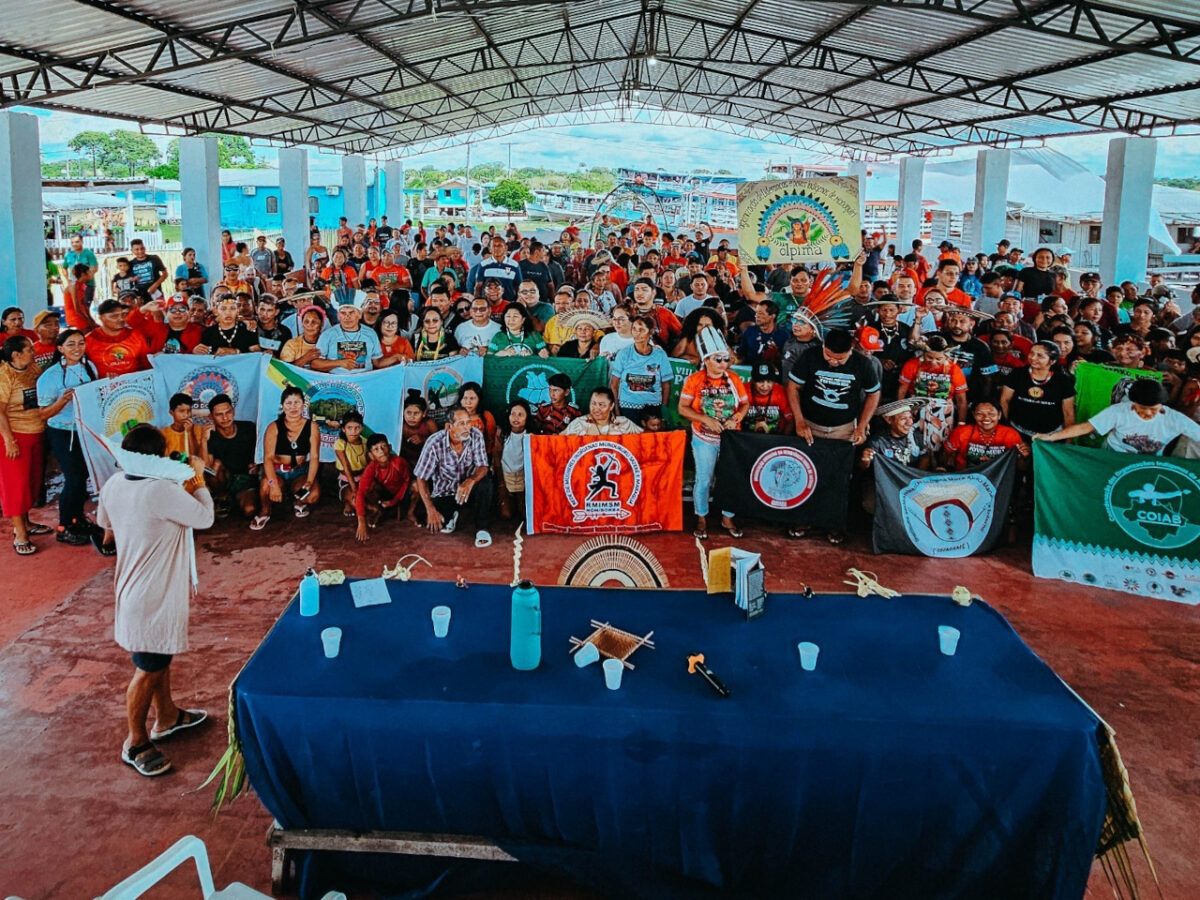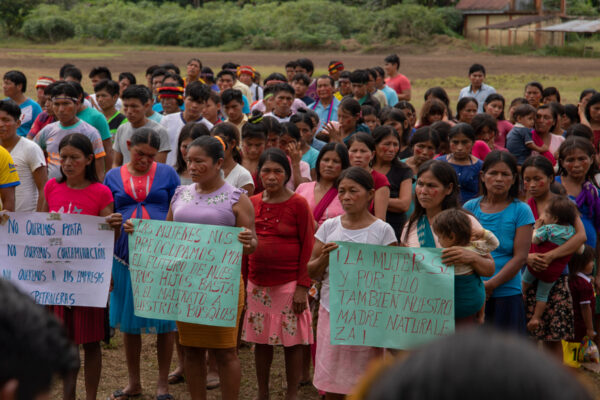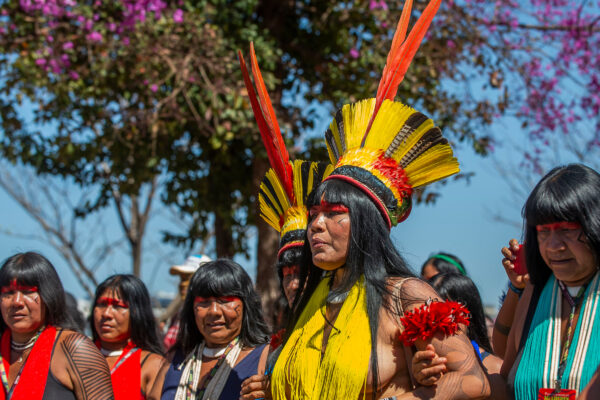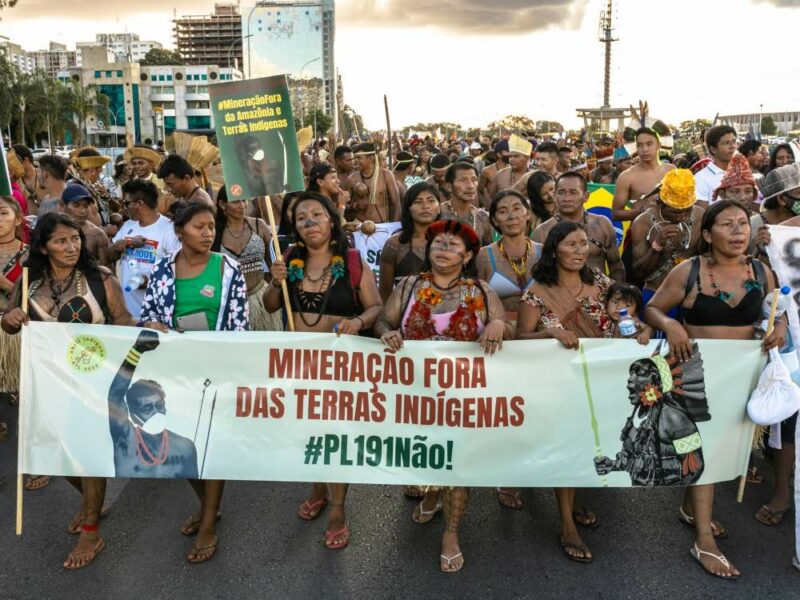Amazonas, Brazil – Leaders of the Mura Indigenous people have announced they will take their complaint against Canadian mining company Brazil Potash (Potássio do Brasil, NYSE: GRO) to COP30, which will be held in November in Belém, Brazil. The announcement was made during the VIII General Assembly of the Mura People, held from May 29 to 31 in the Lago dos Soares village in Amazonas, and it marked the beginning of an international campaign opposing the advancement of a mining project in traditionally occupied Indigenous land. More than 100 Mura leaders are expected to participate in the COP30 delegation.
The Autazes Potash project aims to extract sylvinite – one of the main sources of potassium – in the municipality of Autazes, 113 km from Manaus, in an area that overlaps with the Soares/Urucurituba Indigenous Land, occupied by the Mura for over two centuries. The demarcation process for the land began in 2003, five years before the arrival of the company. Brazil Potash is a subsidiary of Canadian investment group Forbes & Manhattan, which also financed the controversial Belo Sun mining project in Pará.
In a letter summing up the outcomes of the assembly, the Mura assert that “COP30 will be a strategic moment for international mobilization” and denounce “the harassment and attempts by Brazil Potash to co-opt and divide the Mura people,” including a manipulated “consultation” process that disregarded their consultation protocols. The document also condemns the institutional silence in the face of violations of rights guaranteed by the Brazilian Constitution and international treaties. “We will not retreat in the face of pressure from agribusiness, mining companies, or complicit or negligent governments,” the letter states.
The decision to take their complaints to the international arena follows repeated failed attempts to dialogue with the state government of Amazonas, environmental licensing agencies, and Brazil’s judiciary system – which continues to validate violations of constitutional rights and ILO Convention 169. For Ana Alfinito, Amazon Watch Legal Advisor, the Autazes Potash case exposes a broader systemic risk: the deliberate erosion of the legal framework that protects Indigenous rights in Brazil and the attempt to normalize illegal practices in the name of economic interest.
“Brazil’s judiciary is legitimizing clearly flawed processes, where Indigenous communities are coerced, ignored, or used as tools to advance destructive projects. This represents a threat to the constitutional and international legal protections of Indigenous peoples, and consequently, to the climate and life itself. If the justice system fails to guarantee even the most basic rights, such as the right to free, prior, and informed consultation, communities are left with no choice but to seek justice in international arenas,” said the Brazilian attorney.
Justice under pressure
This mobilization takes place amid growing frustration with Brazil’s judiciary, particularly following controversial rulings by the Federal Court of Appeals of the 1st Region (TRF1) that favored the project. A majority of judges in the Court’s 6th Chamber validated a consultation process marked by coercion, promises of financial compensation, and the exclusion of representative Indigenous leadership. They also upheld the authority of the Amazonas state government – a declared supporter of the project – to oversee environmental licensing, contradicting technical assessments by federal agencies that warned of territorial overlap affecting at least three Indigenous lands of the Mura.
In a public statement, organizations including the National Coordination of Indigenous Peoples of Brazil (APIB), the Coordination of Indigenous Organizations of the Brazilian Amazon (COIAB), and the Coordination of Indigenous Peoples and Organizations of Amazonas (APIAM) called the rulings “a dangerous precedent that undermines the right to free, prior, and informed consultation for high-impact projects,” and accused the court of working to legitimize “a process manipulated from the beginning.” They also warned that the decision violates legal precedents established by Brazil’s Supreme Federal Court and the Inter-American Court of Human Rights, both of which recognize the full legal validity of Indigenous lands undergoing demarcation.
“It is unacceptable that the judiciary itself is creating legal precedent to authorize mining in Indigenous lands without the constitutional regulation required,” said Mariazinha Baré, coordinator of APIAM. “The 1988 Constitution is clear: mining in Indigenous territories requires a specific law passed by the National Congress – and such a law does not exist. What they are doing to the Mura people could pave the way for similar violence across the Amazon.”
A megaproject in a sensitive area
Although the company claims that the project will not affect Indigenous lands, a legal analysis by the Federal Public Prosecutor’s Office (MPF) reveals the opposite. The mining site overlaps with the Soares/Urucurituba Indigenous Land, which is still undergoing demarcation, and directly affects two other legally recognized Indigenous lands: Jarauary and Paracuhuba.
Adding to the concern, the project’s Environmental Impact Study refers to the Lago dos Soares village as a “riverside community,” deliberately erasing its Indigenous identity. The village is inhabited by descendants of Mura warriors who fought in the 19th-century Cabanagem rebellion, and its territory is now threatened by aquifer contamination, lake salinization, and destruction of archaeological sites and forests.
At the heart of the legal and political dispute is the consultation process conducted by the company and upheld by TRF1. According to the MPF, the process was marked by a lack of good faith, the exclusion of legitimate leaders, promises of monetary compensation, and meetings held without the presence of oversight agencies – all of which violate ILO Convention 169.
The consultation also ignored the Mura people’s self-determined protocols and created division and coercion within the communities. “They want to divide us so they can silence us. But what’s at stake is the future of our land, our water, and the life of our people. And we will not stand by in silence,” the assembly letter states.













